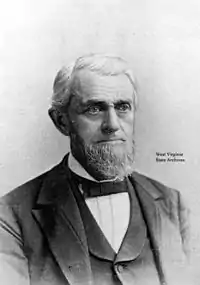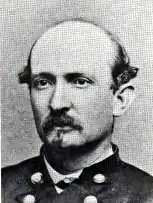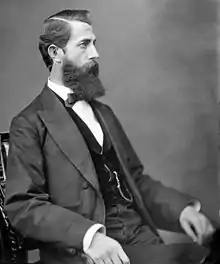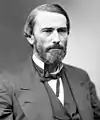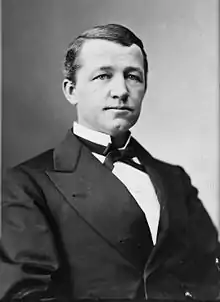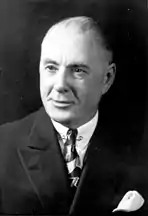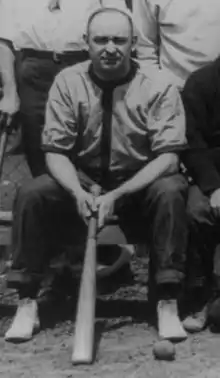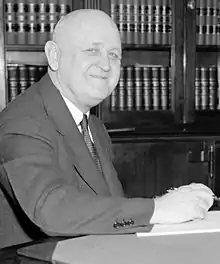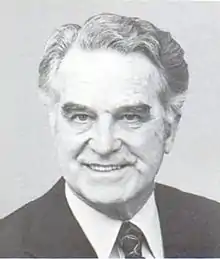West Virginia's 1st congressional district
West Virginia's 1st congressional district is located in the northern part of the state. It is the most regularly drawn of the state's three districts.
| West Virginia's 1st congressional district | |||
|---|---|---|---|
.tif.png.webp) West Virginia's 1st congressional district - since January 3, 2013. | |||
| Representative |
| ||
| Population (2019) | 601,811 | ||
| Median household income | $51,480[1] | ||
| Ethnicity |
| ||
| Cook PVI | R+19[2] | ||
It includes the industrial Rust Belt area of the state's northern panhandle which includes the district's third largest city, Wheeling, as well as Fairmont, Clarksburg, and the college town of Morgantown, the home of the main campus of West Virginia University. The largest city in the district is Parkersburg; the second largest is Morgantown. It also includes many rural farm and timber producing areas. The district has almost no population change reported in the 2010 Census change relative to the other 2 districts, as growth around Morgantown and Parkersburg offset population loss elsewhere, and the district was carried over unchanged for the next ten-year cycle.
The district is currently represented by David McKinley, a Republican who has represented the district since 2011.
West Virginia has tended to give its congressmen very long tenures in Washington, and the 1st District is no exception. Only four men have represented the district since 1953: Bob Mollohan (D) (1953–1957), former Governor Arch Moore, Jr. (R) (1957–1969), Bob Mollohan again (1969–1983), Alan Mollohan (1983–2011) and McKinley.
Despite the lack of turnover in the congressional seat, historically the 1st was not safe for either party. The cities are ancestrally Democratic strongholds, while the rural areas are much more conservative and have a tendency to swing Republican more often. As late as 2014, state legislators were roughly split between both parties.
Historically, the district has been very Democratic, mirroring the state as a whole. However, West Virginia Democrats tend to be somewhat more socially conservative than their counterparts in the rest of the nation, and the district has been swept up in the growing Republican trend in the state at the national level. No Democrat since Bill Clinton (who did so by a plurality in a three-way race) has carried the 1st District in presidential elections. George W. Bush carried the district both times in 2000 with 54% of the vote and 2004 with 58% of the vote. John McCain carried the district in 2008 with 56.77% of the vote while Barack Obama received 41.51%.
History
The First District has always been anchored in Wheeling, and as such has always included Hancock, Brooke, Ohio, Marshall, and Wetzel counties[3]–the five counties usually reckoned as the Northern Panhandle. The original 1863 districting included also Tyler, Pleasants, Doddridge, Harrison, Ritchie, Wood, Wirt, Gilmer, Calhoun and Lewis counties.[3] It was essentially the successor of Virginia's 11th congressional district.
In 1882, the counties of Tyler, Doddridge, Harrison, Gilmer, Lewis and Braxton were added to the core counties.[3] In 1902, the core counties were joined by Marion, Harrison, and Lewis counties.[3] In the 1916 redistricting it included only the five core counties and Marion and Taylor.[3] The district was unchanged in the 1934 and 1954 redistrictings.[3] In 1962, Braxton, Calhoun, Doddridge, Gilmer, Harrison, Lewis, Marion and Taylor joined the five core counties.[3] The 1972 redistricting added Tyler, Pleasants, and Woods and deleted Taylor.[3] The 1982 redistricting added Taylor back to the district.[3]
1992 began the district as currently constituted, consisting of Barbour, Brooke, Doddridge, Grant, Hancock, Harrison, Marion, Marshall, Mineral, Monongalia, Ohio, Pleasants, Preston, Ritchie, Taylor, Tucker, Tyler, Wetzel and Wood counties.[3] In 2002 Gilmer was added.[3] For the election cycle that begins in 2012 the district was unchanged.[3]
Recent presidential elections
| Election results from presidential races | ||
|---|---|---|
| Year | Office | Results |
| 2000 | President | Bush 54 - 43% |
| 2004 | President | Bush 58 - 42% |
| 2008 | President | McCain 57 - 42% |
| 2012 | President | Romney 62 - 36% |
| 2016 | President | Trump 68 - 26% |
| 2020 | President | Trump 68 - 30% |
List of members representing the district
2000
| Party | Candidate | Votes | % | |
|---|---|---|---|---|
| Democratic | Alan Mollohan (incumbent) | 170,974 | 87.78 | |
| Libertarian | Richard Kerr | 23,797 | 12.22 | |
| Total votes | 194,771 | 100.00 | ||
| Democratic hold | ||||
2002
| Party | Candidate | Votes | % | |
|---|---|---|---|---|
| Democratic | Alan Mollohan (incumbent) | 110,941 | 99.71 | |
| write-ins | 320 | 0.29 | ||
| Total votes | 111,261 | 100.00 | ||
| Democratic hold | ||||
2004
| Party | Candidate | Votes | % | |
|---|---|---|---|---|
| Democratic | Alan Mollohan (incumbent) | 166,583 | 67.77 | |
| Republican | Chris Wakim | 79,196 | 32.22 | |
| Total votes | 245,779 | 100.00 | ||
| Democratic hold | ||||
2006
| Party | Candidate | Votes | % | |
|---|---|---|---|---|
| Democratic | Alan Mollohan (incumbent) | 100,939 | 64.29 | |
| Republican | Chris Wakim | 55,963 | 35.65 | |
| Write-ins | 98 | 0.06 | ||
| Total votes | 157,000 | 100.00 | ||
| Democratic hold | ||||
2008
| Party | Candidate | Votes | % | |
|---|---|---|---|---|
| Democratic | Alan Mollohan (incumbent) | 187,734 | 99.93 | |
| Write-ins | 130 | 0.07 | ||
| Total votes | 187,864 | 100.00 | ||
| Democratic hold | ||||
2010
| Party | Candidate | Votes | % | |||
|---|---|---|---|---|---|---|
| Republican | David McKinley | 90,660 | 50.40 | |||
| Democratic | Mike Oliverio | 89,220 | 49.60 | |||
| Total votes | 179,880 | 100.00 | ||||
| Republican gain from Democratic | ||||||
2012
| Party | Candidate | Votes | % | |
|---|---|---|---|---|
| Republican | David McKinley (incumbent) | 133,809 | 62.5 | |
| Democratic | Sue Thorn | 80,342 | 37.5 | |
| Total votes | 214,151 | 100.0 | ||
| Republican hold | ||||
2014
| Party | Candidate | Votes | % | |
|---|---|---|---|---|
| Republican | David McKinley (incumbent) | 92,491 | 64.0 | |
| Democratic | Glen Gainer III | 52,109 | 36.0 | |
| Total votes | 144,600 | 100.0 | ||
| Republican hold | ||||
2016
| Party | Candidate | Votes | % | |
|---|---|---|---|---|
| Republican | David McKinley (incumbent) | 163,469 | 69.0 | |
| Democratic | Mike Manypenny | 73,534 | 31.0 | |
| Total votes | 237,003 | 100.0 | ||
| Republican hold | ||||
2018
| Party | Candidate | Votes | % | |
|---|---|---|---|---|
| Republican | David McKinley (incumbent) | 127,997 | 64.6 | |
| Democratic | Kendra Fershee | 70,217 | 35.4 | |
| Total votes | 198,214 | 100.0 | ||
| Republican hold | ||||
2020
| Party | Candidate | Votes | % | |
|---|---|---|---|---|
| Republican | David McKinley (incumbent) | 180,488 | 69.0 | |
| Democratic | Natalie Cline | 81,177 | 31.0 | |
| Total votes | 261,665 | 100.0 | ||
| Republican hold | ||||
Historical district boundaries
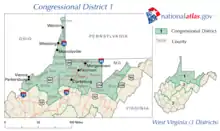
References
- https://www.census.gov/mycd/?st=54&cd=01
- "Partisan Voting Index – Districts of the 115th Congress" (PDF). The Cook Political Report. April 7, 2017. Retrieved April 7, 2017.
- West Virginia Blue Book, pp. 534 (2012 edition)
- Martis, Kenneth C. (1989). The Historical Atlas of Political Parties in the United States Congress. New York: Macmillan Publishing Company.
- Martis, Kenneth C. (1982). The Historical Atlas of United States Congressional Districts. New York: Macmillan Publishing Company.
- Congressional Biographical Directory of the United States 1774–present

